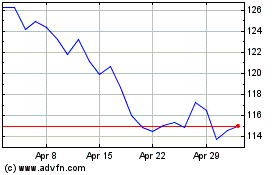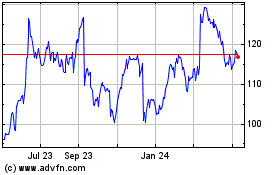Supreme Court to Consider Google Appeal of Oracle Win in Copyright Case
November 15 2019 - 2:54PM
Dow Jones News
By Brent Kendall
WASHINGTON -- The Supreme Court agreed to hear an appeal by
Alphabet Inc.'s Google challenging its loss to Oracle Corp. in a
copyright case that could produce a multibillion-dollar verdict and
have ramifications for the software industry.
The court on Friday announced its review in a brief written
order. The case dates back to 2010, when Oracle alleged Google's
Android smartphone-operating system infringed on copyrights related
to Oracle's Java platform. Oracle acquired the Java technology when
it bought Sun Microsystems Inc. that year.
An appeals court last year rejected Google's defenses and set
new legal proceedings for how much the company owes Oracle in
damages. Oracle has sought as much as $9 billion previously.
The litigation focuses on a key issue in the tech industry: how
software developers use application-program interfaces, or APIs,
prewritten packages of computer code that allow programs, websites
or apps talk to one another.
Oracle alleged Google illegally copied more than 11,000 lines of
Java API code to develop its Android operating system, which runs
more than 2 billion mobile devices world-wide. It also accused
Google of seeking to weaken important legal protections for
software.
"Oracle spent years and hundreds of millions of dollars writing
a blockbuster work -- a software platform," the company said in a
court brief. "Google then refused Oracle's offer of a license and
copied the most recognizable portions of that work into a competing
platform for the express purpose of capturing Oracle's fan
base."
Google argued Oracle shouldn't be able to assert copyrights on
basic software commands, saying its incorporation of the software
interface into its platform was a fair use of Oracle's APIs that
wasn't subject to copyright liability.
An Oracle win "will upend the longstanding expectation of
software developers that they are free to use existing software
interfaces to build new computer programs," Google said in its
petition seeking Supreme Court review.
The case went to trial twice. In the last round, jurors accepted
Google's arguments that its copying of the Java code was fair use,
but the U.S. Court of Appeals for the Federal Circuit overturned
that conclusion last year.
"There is nothing fair about taking a copyrighted work verbatim
and using it for the same purpose and function as the original in a
competing platform," the appeals court said.
The Supreme Court took the case against the advice of the
Justice Department, which argued there was no need for the justices
to intervene. U.S. Solicitor General Noel Francisco said in a court
brief that Oracle's code was eligible for copyright protection. Mr.
Francisco said the lower court's ruling on fair use wasn't "free
from doubt," but argued this particular case wasn't the best
opportunity for the high court to flesh out that area of the
law.
An array of tech companies and trade associations urged the high
court to hear the case, including Microsoft Corp., which said the
lower court's limited view on the fair use of computer code
threatened innovation in software production, which "is often a
highly collaborative process in which many different players
participate."
The Supreme Court is expected to hear the case early next year,
with a decision expected before the end of the court's term in
June.
Write to Brent Kendall at brent.kendall@wsj.com
(END) Dow Jones Newswires
November 15, 2019 14:39 ET (19:39 GMT)
Copyright (c) 2019 Dow Jones & Company, Inc.
Oracle (NYSE:ORCL)
Historical Stock Chart
From Mar 2024 to Apr 2024

Oracle (NYSE:ORCL)
Historical Stock Chart
From Apr 2023 to Apr 2024
